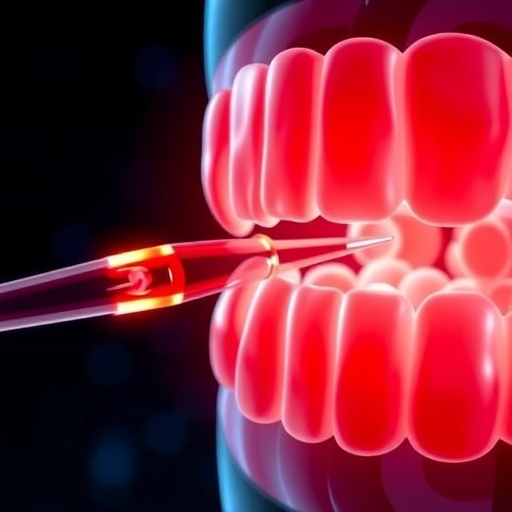In a groundbreaking study published in the Journal of Translational Medicine, researchers have uncovered a significant link between successful endodontic treatment—commonly referred to as root canal therapy—and the improvement of metabolic parameters, specifically glucose and lipid metabolism. This research not only sheds light on the broader implications of dental health but also opens avenues for integrating dental care with metabolic health strategies.
Endodontic treatment has often been viewed primarily through the lens of oral health and pain management. However, Zhang et al. have presented compelling evidence that the benefits of successfully treating infected or damaged teeth can extend well beyond the mouth. Their longitudinal metabolomic study systematically examined how addressing dental infections through root canal procedures can lead to marked improvements in metabolic health markers, including glucose and lipid levels, which are crucial indicators of metabolic syndrome.
The study engaged a diverse cohort of patients who underwent endodontic treatment over a specified longitudinal period. Researchers meticulously tracked changes in the participants’ metabolic profiles before and after their treatments. Utilizing advanced metabolomic techniques, the study provided a rich dataset that allowed for an in-depth analysis of metabolic shifts that occurred as a direct result of the dental interventions.
One of the key findings of the study was the observed reduction in glucose levels among participants following successful endodontic procedures. Elevated glucose levels are often indicative of insulin resistance and can lead to conditions such as type 2 diabetes if left unchecked. By effectively treating dental infections, the patients not only alleviated pain and discomfort but also embarked on a journey toward better metabolic health.
Additionally, the study highlighted improvements in lipid metabolism as well, which is critical given the rising prevalence of dyslipidemia—an abnormal amount of lipids in the blood—worldwide. The authors noted that as fatty acid profiles improved significantly in participants post-treatment, this could result in decreased cardiovascular risk. This fascinating synergy between dental health and systemic health underlines the importance of holistic healthcare approaches.
The relationship between oral bacteria and systemic health has been a growing field of interest in recent years. Infections within the oral cavity, particularly those associated with periodontitis, have been implicated in the pathogenesis of various systemic diseases, including cardiovascular conditions. The findings of this study add another dimension to this relationship by illustrating how specific dental treatments can remediate these risks through improved metabolic functioning.
Furthermore, the study’s findings challenge traditional approaches to health intervention strategies. While most healthcare models tend to segregate dental health from other areas of health, this research advocates for an integrated approach. Healthcare professionals across disciplines might need to reconsider how dental health influences overall wellness and metabolic parameters. This study presents a compelling case for interdisciplinary collaboration between dentists and physicians to devise more effective treatment plans for patients.
Despite the study’s promising findings, it is important to approach these results with a critical lens. The authors acknowledge that while their research establishes a correlation between successful endodontic treatment and improvements in metabolic health, further research is necessary to elucidate the underlying mechanisms driving these changes. Future studies could focus on the specific biological pathways influenced by dental health and how they intersect with metabolic functions.
Importantly, this study also raises awareness about the potential consequences of neglecting dental care. Many individuals do not appreciate the systemic implications of untreated dental infections, often believing such health issues are confined to the mouth. This perception could lead to an increased incidence of metabolic disorders, underscoring the necessity for public health campaigns that educate on the importance of maintaining both oral and overall health.
Zhang and colleagues have set a precedent in the field of health research, where the intersections of various health disciplines are becoming increasingly blurred. Their pioneering work emphasizes the need for a more comprehensive understanding of health that transcends traditional boundaries, integrating efforts in dentistry with those in metabolic health to create a more cohesive approach to patient care.
As the medical community continues to grapple with the growing epidemic of metabolic disorders, incorporating findings such as those presented in this study may lead to innovative healthcare solutions. By recognizing the dental-systemic connection, health practitioners can form strategies that reduce the burden of metabolic diseases, improving quality of life for countless individuals.
In conclusion, the study conducted by Zhang et al. serves as an eye-opener into the profound relationship between dental health and metabolic balance. It shines a light on the importance of successful endodontic treatment as not only a means to alleviate oral pain but also as a potential catalyst for enhanced metabolic health. As evidence mounts for these connections, we may soon find ourselves in an era that champions interdisciplinary healthcare practices, leading to more holistic and effective treatment methodologies for patients worldwide.
Subject of Research: The relationship between endodontic treatment and improvements in metabolic health, specifically glucose and lipid metabolism.
Article Title: Successful endodontic treatment improves glucose and lipid metabolism: a longitudinal metabolomic study.
Article References:
Zhang, Y., Le Guennec, A., Pussinen, P. et al. Successful endodontic treatment improves glucose and lipid metabolism: a longitudinal metabolomic study.
J Transl Med 23, 1195 (2025). https://doi.org/10.1186/s12967-025-07110-0
Image Credits: AI Generated
DOI: https://doi.org/10.1186/s12967-025-07110-0
Keywords: Endodontics, Metabolic Health, Glucose Metabolism, Lipid Metabolism, Interdisciplinary Healthcare.
Tags: dental health and metabolic syndromedental infections and systemic healthendodontic treatment and metabolismglucose metabolism improvementimplications of endodontic therapyintegrating dental care with metabolic healthlipid metabolism enhancementlongitudinal metabolomic studyoral health impact on metabolismoral health research advancementspatient outcomes in endodonticsroot canal therapy benefits





